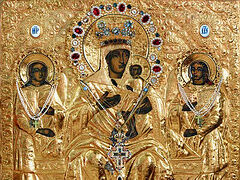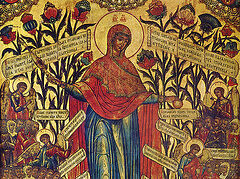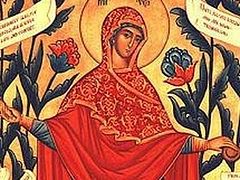“How much farther, brother?” a thin, fair-haired girl was holding tightly on to the hand of a tall, sturdy boy who was walking confidently along the dusty road.
“Tired, Mashutka? If you want, climb up and I'll carry you on my back.”
“No, Vanya, your bag is heavy enough. I'll walk on my own; I'm not some little girl. Just tell me, how far are we to go?”
“Look up, there’s a cross shining ahead.”
A cross of a great church did indeed come into view from behind the towering poplars. It meant that they’ve reached Porechye and will soon get to a busy fairground beyond the river Uzhen’. That’s where the brother and sister were heading. They set out early, as soon as the sun gleamed white through a morning fog.
Ivan was a blacksmith, and rumor had it that many horses were up for sale at the fair this year. So he decided to make some extra money. He took his little sister with him, so she wouldn’t stay home alone—they were orphaned three years ago after a great illness that swept through the Tver region.
In Porechye, Masha kept looking around; she was curious to know how other people lived. It was a large village, unlike their settlement consisting of just five huts. True, they had the nobleman’s house across the brook, although it barely differed from the peasants’ huts. Perhaps simply in its size. Prokhor Semyonovich, the local landowner, was practically as poor as his peasants. That’s why he willingly released anyone asking to go in search of a living, as long as they had money to pay the rent.
“Give a penny, give a penny,” the girl heard someone’s melodious voice.
A middle-aged woman in a dusty, tattered cloak was sitting at the gate of the church and continued her sing-song request without even looking at anyone. At this evening hour, there were neither many nor a few people outside the church. Some would simply walk by, while others would give the beggar some bread or coins.
Suddenly the woman looked straight at Masha, who just pulled level with her, and suddenly speaking in a different, distinct, but quiet voice, said: “Take care of your brother.”
The woman looked at Masha and distinctly, but quietly said: “Take care of your brother”
The girl started in surprise and held on tightly to Vanya’s big hand. He noticed nothing and didn’t stop; they had yet to find a place to spend the night.
“What kind of a tree is that? Oh, what a cute birdie! Does this river have a name?” Masha was a curious girl, and her brother always found answers to her questions. He even knew how to read—when Prokhor Semyonovich’s son Alexey was still at home, they became great friends and so he learned from him.
“Sure, it has a name,” smiled Ivan, lifting his little sister to carry her piggyback as he waded across the shallow water of the “Glinenka.”
Tall rye with green spikes that hadn’t yet come full strength stood on both sides of a wide road. The sun on this warm June evening had just turned towards the horizon and splashed everything around with bright, lush colors. A breeze blew soft ripples over the field, and agile birds were cheerfully circling high up in the skies.
As if on an island, the large Minovskoye village spread out freely in the distance. Once you walk through it, and right there, behind the bridge across Uzhen’, you could hear all the noise, laughter, and sounds of the fair.
They asked their distant relative to let them in to spend the night in the hayloft. And Ivan immediately got busy—he helped the owner—a scrawny elderly man with weary eyes—fix a sagging fence.
“Have you heard what we had at the fair?” The man grunted for some time before talking.
“No, I haven't.”
“Pagans, sorcerers,” Tamon—the man’s name—spat and crossed himself. “They can barely speak our language, so they just mumble something. They set up their camp not far from the village. The boys peeped at them, they say they even have a wooden idol. And they worship it.”
“I say!... Where are they from?”
“Nobody knows. Only our men are already thinking of chasing them away. To be on the safe side,” Tamon grew silent. “There's a lot of them, those heathen; they’re all tough-looking and so dark you can't even see their eyes. Creepy. So, will you go with us, Ivan?”
“If need be, I will... But what if we talk to them first and find out if they want anything?”
“We tried to talk to them. They just growl and wave their fists. And their women are nasty. They look at you like that…” the narrator could not find the proper word and left it at that. “Ach! They must be witches.”
“When will you go?”
“Once we get more men, we'll go.”
As they settled on the hayloft, Masha moved closer to her brother and asked:
“Vanya, who are the ‘heathen’?”
“Where did you hear that?”
“Everyone talks about them.”
“Nobody. Go to sleep.”
“Are they scary?”
“No, they aren’t scary. You'll see tomorrow.”
At the fair, a line formed immediately to see Ivan: someone needed a horse to be shod, or tools adjusted, or even possibly a bracelet or earrings forged—he was also capable of working with such delicate pieces as well.
Masha spent time playing with the children she knew and would often run up to her brother to tell him that she was doing fine.
They arranged to play hide-and-seek. The girl did not notice how she ran far away from the noisy fairground. She was attracted by the singing of a soft tune. It sounded familiar, but the she couldn't quite get its words. Masha followed a barely perceptible path and found herself at the edge of a small clearing. An odd scene opened before her eyes. Several people were crossing themselves and praying. They were facing a wooden figure.
The girl seemed to recognize the prayer she had heard in her church. But the words sounded odd. She backed away a few steps, turned around, and almost screamed.
A black-haired, dark-eyed boy was standing in front of her. He quickly put a finger to his lips and beckoned her to follow him.
“What’s your name?” he asked. The words sounded odd, but clear.
“Masha.”
“And my name’s Vasya, in your language,” her new friend smiled.
“Why ‘in our language’? You sound so odd. And what's that, some kind of a...,” the girl had difficulty naming the wooden figure and instead pointed her finger in its direction.
“In your language, because we aren’t Russians. Few of us can speak your language,” the boy dutifully pronounced the words.
The children settled on a large, low-lying bough of a birch tree. They had a good view of the fair, but no one could see them.
“We come from the north in search for a place to settle down. We were chased out of our village because of our faith. Long ago, a kind priest baptized my grandfather, and the Russians lived nearby. Then they left. The others treated us badly, and then, in the spring, they kicked us out for good.
Such a long speech was quite an effort for Vasyatka, and he paused to catch his breath. Masha was sitting with her eyes wide open. She’s never heard of such strange things before.
“And we pray to our Lord Jesus,” the boy crossed himself. “Batiushka gave his blessing to make an icon out of wood. None of us know how to paint, but a lot of us can carve beautiful things.”
Masha wanted to hear more, but she suddenly recognized a sound that caught her attention—her brother was calling her.
“Vasya, it’s good that you told me everything,” she shouted, getting down from the tree. “Let’s be friends. “I will come to see you tomorrow.”
The girl could not wait to tell her brother about the amazing discovery. But he was so distracted and tired that he wouldn't listen.
“Stay at Aunt Dunya's tomorrow!" he kept saying repeatedly, “I am not going to take you to the fair. The children shouldn't see…” he suddenly checked himself and kept saying the same in response to all questions. “I'll tell you when we get home. Stay in the village.”
Masha noticed that the men had gathered in the yard, angrily discussing something. But the children were strictly forbidden to go out that evening. She began to feel worried and uneasy; the voices she overheard from the hayloft where she and some other children were sent to sleep sounded stern and menacing.
How did she manage to run so quickly into the woods behind the fair? Masha looked around. It was quiet and peaceful. The blue sky was seen through the bright green of the birches. Snow-white clouds hung over the trees. Water gently murmured somewhere. And for some reason, there were no people around. The girl was not at all frightened when she saw a young, beautiful Lady in a long blue dress.
“Come here, my dear,” She called out.
The girl went to her.
“Look, this is where I am going to leave My icon,” the Woman said softly and pointed to a spring the girl had heard about before. “Tell your brother that he should help My children from a distant land. He can take them to Prokhor. He will take care of them. Will you remember?”
Look, this is where I am going to leave My icon
Masha nodded.
“And here, all of you are to build a home for Me,” the Woman smiled and stroked Masha's head. “Wake up, it’s time,” she said, and the wondrous vision faded away.
The girl opened her eyes—oh, what a dream! The pale morning sun was shining on her from a tiny window. Everything was quiet. She slipped behind the door to the yard and called for her brother, but the lady of the house answered her.
“Everyone had gone to chase the heathen away. And you are to stay with me.”
“What heathen?” The little girl didn't understand.
“Those dark people, with idols, who don’t speak our language.”
Masha pondered what she heard for a while. So, Vasya and his family were called the heathens. But that beautiful and kind Woman in her dream spoke of the strangers as Her children. And, it turns out that her brother was up to no good against these poor people. She rushed out of the house. Even her the lady’s shouts couldn’t stop her.
The fair, so cheerful before, had was now disorderly and chaotic. The girl saw that frightened women with children were huddled together on one side. In the center, groups of men were lined up against one another. They differed greatly in height and hair color, but all of them looked gloomy and angry. Some were holding on to large sticks and even pitchforks.
Suddenly everything went quiet; there was a spine-chilling silence that startled Masha, causing her to stand still not far off. She was looking out for her brother and someone else. Vasya. He wasn’t with children, although he was hardly older than Masha; but there he was, on the fringe of the crowd, next to a stout and dark-skinned man.
The girl slowly approached her brother, took him by hand and pulled him along. The young blacksmith gave a start of surprise.
“Masha, why are you here?” he whispered. “Go back to the village. Didn’t I tell you?”
“Brother, the Lady asked me to protect the strangers. Do not hurt them,” the girl whispered fervently.
A husky man with a club in his hand, looked back and shushed her:
“Go away right now! Ivan, send her away.”
Her brother turned her around by the shoulders and gently nudged her toward Minovskoye. But she resisted.
“The Lady left you the icon,” she remembered the instructions. And immediately, an image of a path leading into the woods and the spring appeared before her eyes. Also, the cloud, that same cloud from her dream that hung over the birches.
“Please come, and I'll show you!”
Ivan was bemused by his little sister’s behavior. Besides, her words, the “Lady” and “icon” sounded so odd at this anxious moment that he allowed the girl to lead him away.
A rivulet was flowing under the cool canopy of trees. When the brother and sister came near, a ray of sunlight peeked from behind a cloud and, pointing like a finger, lit a dark alder bush.
Ivan froze at first and then crossed himself. The icon of the Mother of God was gazing straight at him. Masha also crossed herself, came closer and took the icon in her hands.
 “This Lady visited me,” she said hurriedly. “She told me, take these strangers to our landowner, Prokhor Semyonovich. They are baptized, Vanya. Vasyatka told me so; we met yesterday. They’re not heathen, they have the icon of the Lord,” the girl started to sob.
“This Lady visited me,” she said hurriedly. “She told me, take these strangers to our landowner, Prokhor Semyonovich. They are baptized, Vanya. Vasyatka told me so; we met yesterday. They’re not heathen, they have the icon of the Lord,” the girl started to sob.
“Wait, what are you saying, I can't keep up with you,” Vanya carefully took down the icon, took the girl by the hand and hurried back.
“Wait a minute,” he loudly exclaimed once he left the forest. “Wait, everybody, let me speak.”
The men grumbled grudgingly. But some were actually glad to have an unexpected breather. A little bit more, and the hotheads among the locals would resort to blows. These dark strangers struggled to understand why they were chased off and, in addition to that, only a few of them could speak Russian. Those who did understand were trying to explain the situation to the rest, who yelled some incomprehensible threats in return. Apparently, they were swearing.
Ivan stood between his people and the strangers and held the icon up high.
“Here,” he said loudly. “I found this miracle with my sister’s help.”
Then he realized that dozens of eyes were staring at him, and got nervous. But Masha intervened.
“They are not heathen,” she said, uttering this new, unpleasantly sounding word. “They are the children of the Lady. They were banished for our faith!”
“Really?! It can't be! They’ve an idol there,” voices were heard saying.
“Vasya, you tell them,” Masha called out to her friend.
“No idol, we were baptized,” explained the boy sheepishly.
He said something to the women. One of them left and soon returned with something wrapped in a clean white canvas. She unwrapped it and showed the elaborately carved figurine of Jesus.
“We don't have an icon; craftsmen made this. Father Nikolai blessed it long time ago,” explained Vasya.
Masha grew bolder. She saw that the dire situation was changing for the better. The embarrassed men hid their sticks behind their backs or even threw them away. A lot of them walked up to see and venerate the icon of the Mother of God.
“The Lady said that we are to build a house for Her next to the spring,” the girl said loudly.
“Well, that's good, it’s the right thing to do,” the men nodded in approval.
A wooden chapel by the spring was built in no time. The strangers turned out to be skilled carpenters. A priest arrived from the Church of the Holy Life-Giving Trinity in Porechye village. He determined that the icon of the Mother of God that Masha found was called the "Joy of All Who Sorrow.” And the chapel was consecrated in Her name.
Every year, on the day of the icon’s veneration, a procession of the cross would arrive there. Masha, her brother, and Vasya with his relatives always took part in the feast. Everyone was happy that an evil undertaking had turned into a godly and wondrous event. Soon, the people noticed that the water from that spring helped heal various ailments—provided the request was made in good faith and accompanied by a sincere prayer.
P.S. This story is about the holy spring near the village of Minovskoye. In 1842, the “Joy of All Who Sorrow” Icon of the Mother of God miraculously appeared a quarter of a verst1 from the river Melech.







